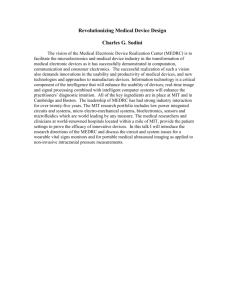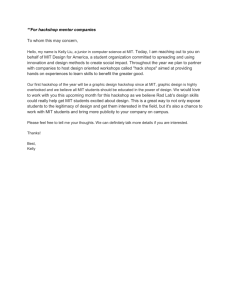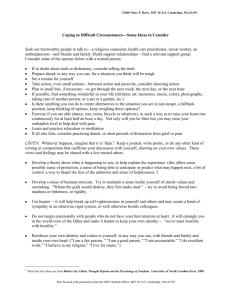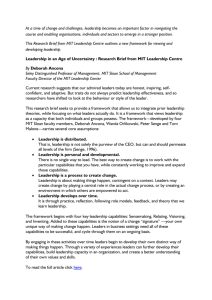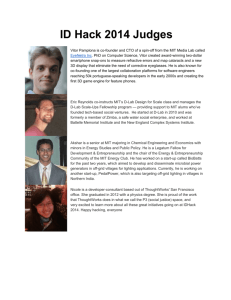Wed104
advertisement
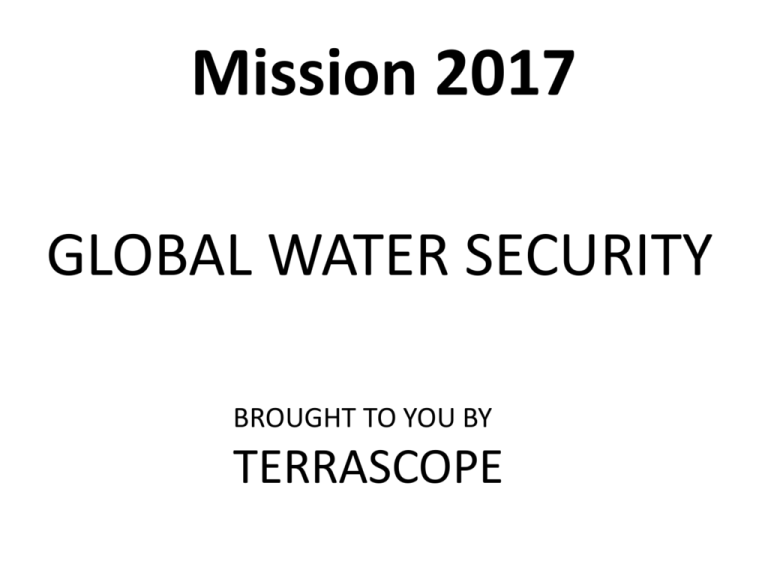
Mission 2017 GLOBAL WATER SECURITY BROUGHT TO YOU BY TERRASCOPE Terrascope: Social Structure First year learning community You will develop friendships and bonds that last for your time at MIT and beyond Terrascope Room 16-xxx a place to study, hang out, interact, cook, eat, SLEEP, always someone around to talk to Terrascope lunches: see calendar—eat, listen (or not), learn Special activities: movie nights, special dinners, and ideas? Terrascope: Academic Structure First Semester • 12.000: Mission 2017: Solving Complex Problems Second Semester • • • 1.016: Communicating Complex Environmental Issues: Building Solutions and Communicating Ideas Terrascope Field Experience (Spring Break) Terrascope Radio Solving Complex Problems • • • Multidisciplinary, project-based learning experience Students work toward a solution to a deceptively simple problem related to Earth’s environment Each year’s theme is different and referred to as “Mission 20XX”, where 20XX refers to the graduation year of the class involved Solving Complex Problems: Motivation • To build in you the capacity to tackle “big” problems that confront society • To encourage you to take charge of the learning process • To show you how to do independent research, to evaluate the quality of information sources, and to synthesize different information streams Solving Complex Problems: Motivation • To encourage you to think about optimal solutions rather than correct solutions • To help you learn to work effectively as part of a team • To improve your communication skills: web site and formal oral presentation • To convince you of your potential!! Past Missions • • To develop strategies for developing countries in the Pacific basin to cope with tsunami hazards and disasters. Due to the unique needs of each country, we specifically focused on developing plans for Peru and Micronesia. To develop a plan for the reconstruction of New Orleans and the management of the Mississippi River and the Gulf coast. Past Missions • • • To develop strategies to deal with the collapse of the global fisheries and the general health of the oceans To develop a plan to ensure the availability of fresh clean water for western North America for the next 100 years. Propose an integrated global solution to the rapid rise in atmospheric CO2 that will stabilize concentrations at an economically viable and internationally acceptable level. Subject Structure • • • • Problem divided into 5 or more subtopics and students divide into teams Each team assigned a Undergraduate Teaching Fellow and Alumni Mentors and have access to the library staff Each team will be responsible articulating the nature of the problem and developing a range of strategies and options to deal with it Teams are a starting point—you control their survival Subject Deliverables • • • • Each team will communicate through wikibased structure The entire class will describe and justify its overall plan in a comprehensive web site Each class explains the design in a sixty to ninety minute presentation before a panel of experts and a general audience. Presentation will be webcast around the world “The whole world is watching, the whole world is watching…..” Mission 2010 Mission 2012 Mission 2013 Mission 2014 “What I have learned is that passion, along with curiosity, drives science. Passion is the mysterious force behind nearly every scientific breakthrough. Perhaps it’s because without it you might never be able to tolerate the huge amount of hard work and frustration that scientific discovery entails….” “For the next four years you will get to poke around the corridors of your college, listen to any lecture you choose, work in a lab. The field of science you fall in love with may be so new it doesn’t even have a name yet. You may be the person who constructs a new biological species, or figures out how to stop global warming, or aging. Maybe you’ll discover life on another planet. My advice to you is this: Don’t settle for anything less.” Nancy Hopkins, a professor of biology at M.I.T., has been teaching since 1973. Extracted from OP-ED contribution in New York Times, September 5 2009 Important Contacts Anne Bauer (annbauer@mit.edu) (Teaching Assistant) Chris Sherratt (gcsherra@mit.edu) (Library staff) Daniel Sheehan (dsheehan@mit.edu) (GIS specialist) Ari Epstein (awe@alum.mit.edu) (Terrascope staff and Terrascope Radio) Debra Aczel (daczel@mit.edu) (Terrascope Administrator) Sam Bowring (sbowring@mit.edu) (Terrascope Director) Field Trip March 21-29th 2014 Field Trip March 21-29th 2014 • In conjunction with Nelson Mandela Metropolitan University, Port Elizabeth, South Africa • A trip to explore the water security issues and the cultures of South Africa MEET THE UTFs Come on down!! Dirk Stahlecker Linda Seymour Julia Longmate Jaya Narain Laura Standley Heather Sweeney Anna Walsh Lealia Xiong Jessica Fujimori Sabina Maddila Judy Pu Patience Stevens Ana Vazquez Holly Josephs Rin Yunis Your Mission is to.... Your Mission is to devise and plan the implementation of bold new strategies to ensure that all nations — including those considered to be underdeveloped — have access to clean fresh water while preserving fresh water ecosystems. Your plan should include incentives to get people to act on your solutions. This issue cannot be ignored and quite simply, the future of humankind hangs in the balance. http://www.nhn.ou.edu/~jeffery/course/c_energy/energyl/lec004/wat er_cycle_001.png “Water is also central to other core economic, social, and political issues such as poverty, health, hunger, environmental sustainability, conflict and economic prosperity. As society seeks to meet demands for goods and services for a growing population, we must improve our understanding of the fundamental science of the hydrological cycle, its links with related global processes, and the role it plays in ecological and societal well-being.” From Gleick et al 2013 First “assignment” Re-write this definition and email to sbowring@mit.edu before 2 PM Friday Second “assignment” Part A: Read three short papers on “Tragedy of the Commons” on website Hardin 1968 Kay 1997 Hardin 1998 de Villiers 2012 Come to class on Monday September 9th ready to discuss QUIZ Where is class this Friday? QUIZ 3-270 Be there

